BBC Organizational Behavior: Culture, Politics, Power & Motivation
VerifiedAdded on 2024/06/10
|25
|5703
|162
Report
AI Summary
This report provides an in-depth analysis of organizational behavior within the BBC, examining the influence of culture, politics, and power on employee behavior and team performance. It evaluates the impact of different organizational cultures, such as power culture, and their consequences on ethical practices and employee morale. Furthermore, the report explores various motivational theories, including Maslow's Hierarchy of Needs and Adam's Equity Theory, to identify effective strategies for motivating individuals and teams within the BBC. The study also investigates team dynamics, factors contributing to effective teams, and barriers to performance, suggesting improvements based on organizational behavior concepts. The analysis highlights the importance of ethical leadership, balanced power distribution, and a supportive work environment for enhancing productivity and fostering a positive organizational culture at BBC.

ORGANIZATIONAL BEHAVIOR
0
0
Paraphrase This Document
Need a fresh take? Get an instant paraphrase of this document with our AI Paraphraser
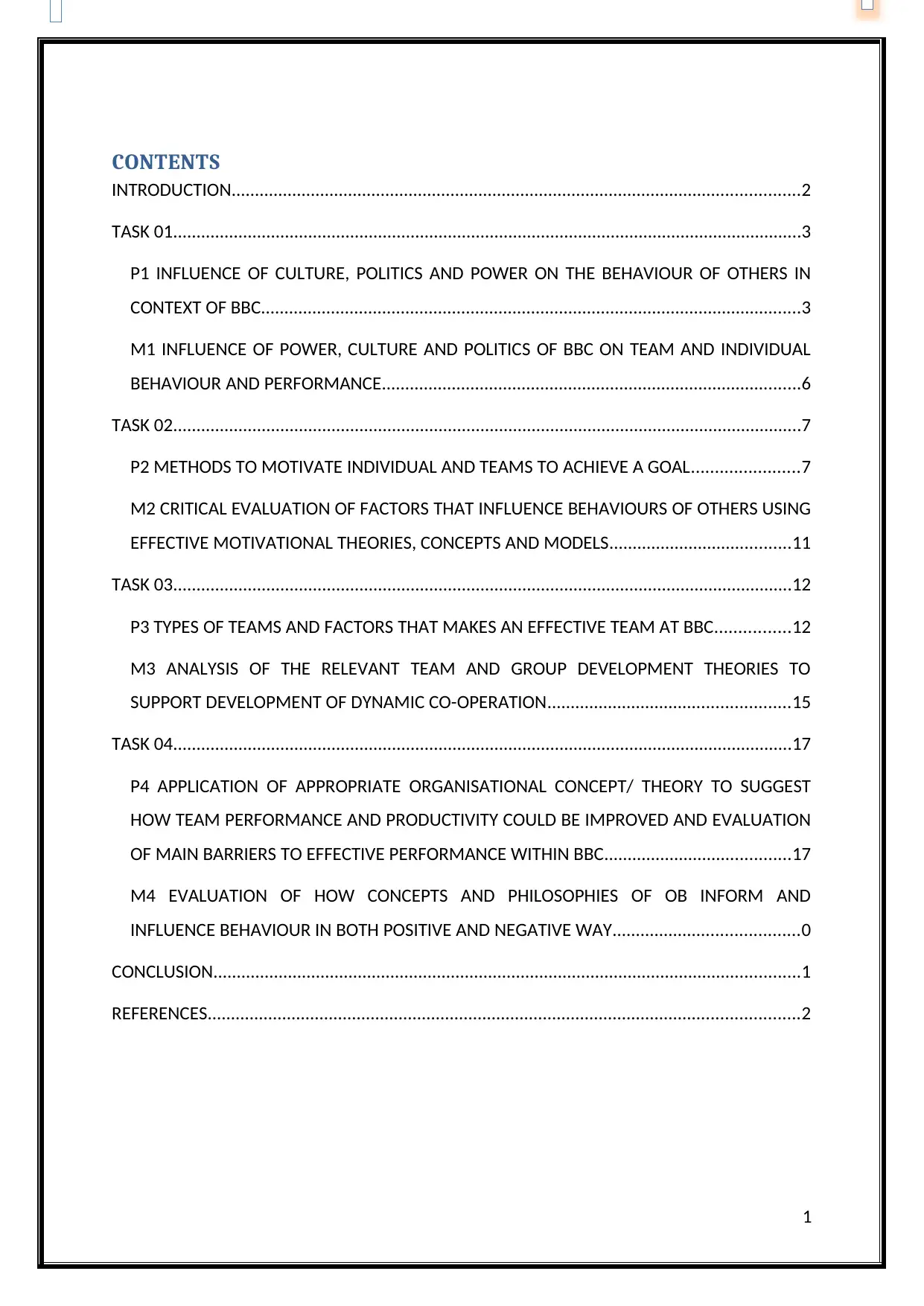
CONTENTS
INTRODUCTION..........................................................................................................................2
TASK 01.......................................................................................................................................3
P1 INFLUENCE OF CULTURE, POLITICS AND POWER ON THE BEHAVIOUR OF OTHERS IN
CONTEXT OF BBC....................................................................................................................3
M1 INFLUENCE OF POWER, CULTURE AND POLITICS OF BBC ON TEAM AND INDIVIDUAL
BEHAVIOUR AND PERFORMANCE..........................................................................................6
TASK 02.......................................................................................................................................7
P2 METHODS TO MOTIVATE INDIVIDUAL AND TEAMS TO ACHIEVE A GOAL.......................7
M2 CRITICAL EVALUATION OF FACTORS THAT INFLUENCE BEHAVIOURS OF OTHERS USING
EFFECTIVE MOTIVATIONAL THEORIES, CONCEPTS AND MODELS.......................................11
TASK 03.....................................................................................................................................12
P3 TYPES OF TEAMS AND FACTORS THAT MAKES AN EFFECTIVE TEAM AT BBC................12
M3 ANALYSIS OF THE RELEVANT TEAM AND GROUP DEVELOPMENT THEORIES TO
SUPPORT DEVELOPMENT OF DYNAMIC CO-OPERATION....................................................15
TASK 04.....................................................................................................................................17
P4 APPLICATION OF APPROPRIATE ORGANISATIONAL CONCEPT/ THEORY TO SUGGEST
HOW TEAM PERFORMANCE AND PRODUCTIVITY COULD BE IMPROVED AND EVALUATION
OF MAIN BARRIERS TO EFFECTIVE PERFORMANCE WITHIN BBC........................................17
M4 EVALUATION OF HOW CONCEPTS AND PHILOSOPHIES OF OB INFORM AND
INFLUENCE BEHAVIOUR IN BOTH POSITIVE AND NEGATIVE WAY........................................0
CONCLUSION..............................................................................................................................1
REFERENCES...............................................................................................................................2
1
INTRODUCTION..........................................................................................................................2
TASK 01.......................................................................................................................................3
P1 INFLUENCE OF CULTURE, POLITICS AND POWER ON THE BEHAVIOUR OF OTHERS IN
CONTEXT OF BBC....................................................................................................................3
M1 INFLUENCE OF POWER, CULTURE AND POLITICS OF BBC ON TEAM AND INDIVIDUAL
BEHAVIOUR AND PERFORMANCE..........................................................................................6
TASK 02.......................................................................................................................................7
P2 METHODS TO MOTIVATE INDIVIDUAL AND TEAMS TO ACHIEVE A GOAL.......................7
M2 CRITICAL EVALUATION OF FACTORS THAT INFLUENCE BEHAVIOURS OF OTHERS USING
EFFECTIVE MOTIVATIONAL THEORIES, CONCEPTS AND MODELS.......................................11
TASK 03.....................................................................................................................................12
P3 TYPES OF TEAMS AND FACTORS THAT MAKES AN EFFECTIVE TEAM AT BBC................12
M3 ANALYSIS OF THE RELEVANT TEAM AND GROUP DEVELOPMENT THEORIES TO
SUPPORT DEVELOPMENT OF DYNAMIC CO-OPERATION....................................................15
TASK 04.....................................................................................................................................17
P4 APPLICATION OF APPROPRIATE ORGANISATIONAL CONCEPT/ THEORY TO SUGGEST
HOW TEAM PERFORMANCE AND PRODUCTIVITY COULD BE IMPROVED AND EVALUATION
OF MAIN BARRIERS TO EFFECTIVE PERFORMANCE WITHIN BBC........................................17
M4 EVALUATION OF HOW CONCEPTS AND PHILOSOPHIES OF OB INFORM AND
INFLUENCE BEHAVIOUR IN BOTH POSITIVE AND NEGATIVE WAY........................................0
CONCLUSION..............................................................................................................................1
REFERENCES...............................................................................................................................2
1
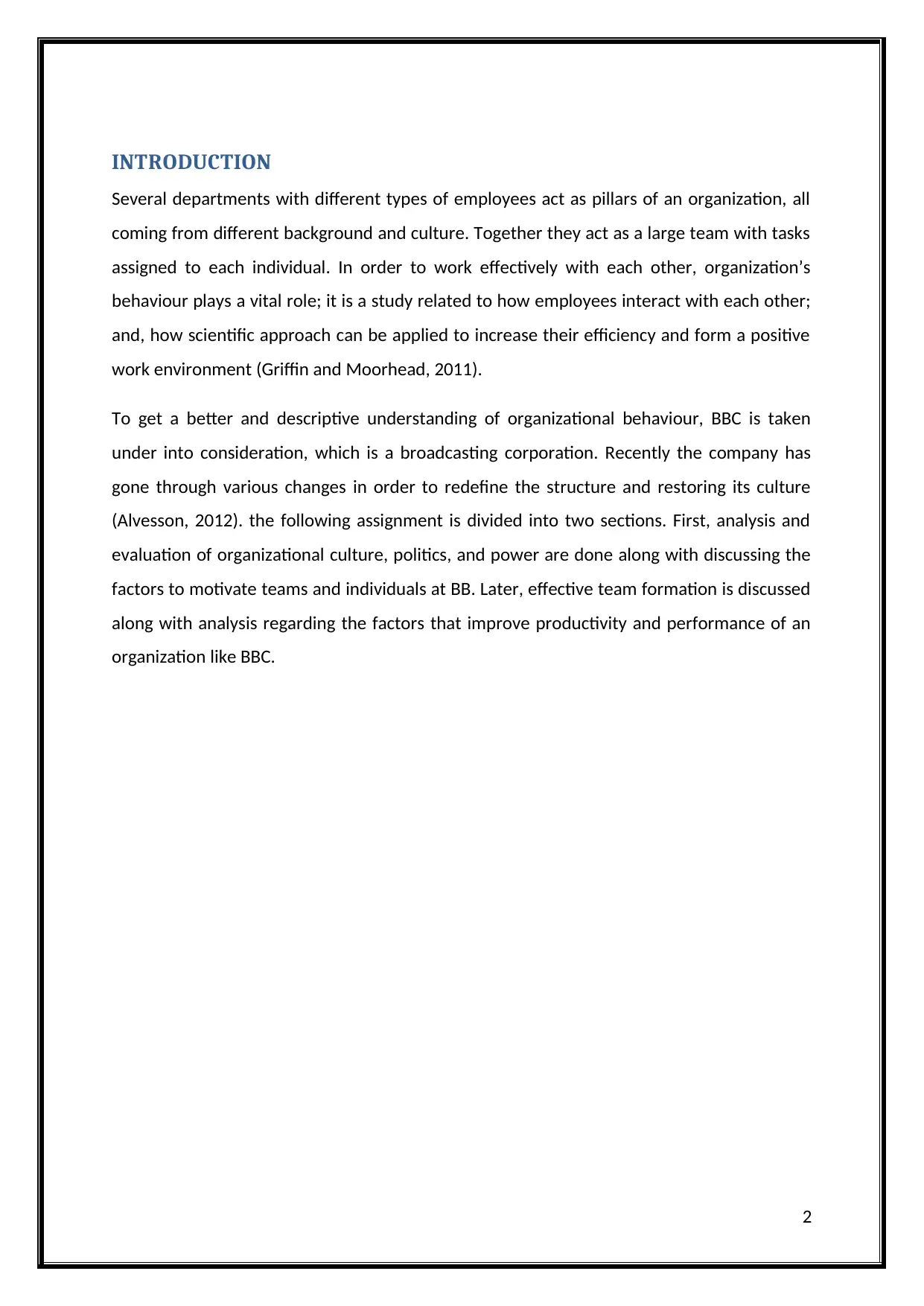
INTRODUCTION
Several departments with different types of employees act as pillars of an organization, all
coming from different background and culture. Together they act as a large team with tasks
assigned to each individual. In order to work effectively with each other, organization’s
behaviour plays a vital role; it is a study related to how employees interact with each other;
and, how scientific approach can be applied to increase their efficiency and form a positive
work environment (Griffin and Moorhead, 2011).
To get a better and descriptive understanding of organizational behaviour, BBC is taken
under into consideration, which is a broadcasting corporation. Recently the company has
gone through various changes in order to redefine the structure and restoring its culture
(Alvesson, 2012). the following assignment is divided into two sections. First, analysis and
evaluation of organizational culture, politics, and power are done along with discussing the
factors to motivate teams and individuals at BB. Later, effective team formation is discussed
along with analysis regarding the factors that improve productivity and performance of an
organization like BBC.
2
Several departments with different types of employees act as pillars of an organization, all
coming from different background and culture. Together they act as a large team with tasks
assigned to each individual. In order to work effectively with each other, organization’s
behaviour plays a vital role; it is a study related to how employees interact with each other;
and, how scientific approach can be applied to increase their efficiency and form a positive
work environment (Griffin and Moorhead, 2011).
To get a better and descriptive understanding of organizational behaviour, BBC is taken
under into consideration, which is a broadcasting corporation. Recently the company has
gone through various changes in order to redefine the structure and restoring its culture
(Alvesson, 2012). the following assignment is divided into two sections. First, analysis and
evaluation of organizational culture, politics, and power are done along with discussing the
factors to motivate teams and individuals at BB. Later, effective team formation is discussed
along with analysis regarding the factors that improve productivity and performance of an
organization like BBC.
2
⊘ This is a preview!⊘
Do you want full access?
Subscribe today to unlock all pages.

Trusted by 1+ million students worldwide
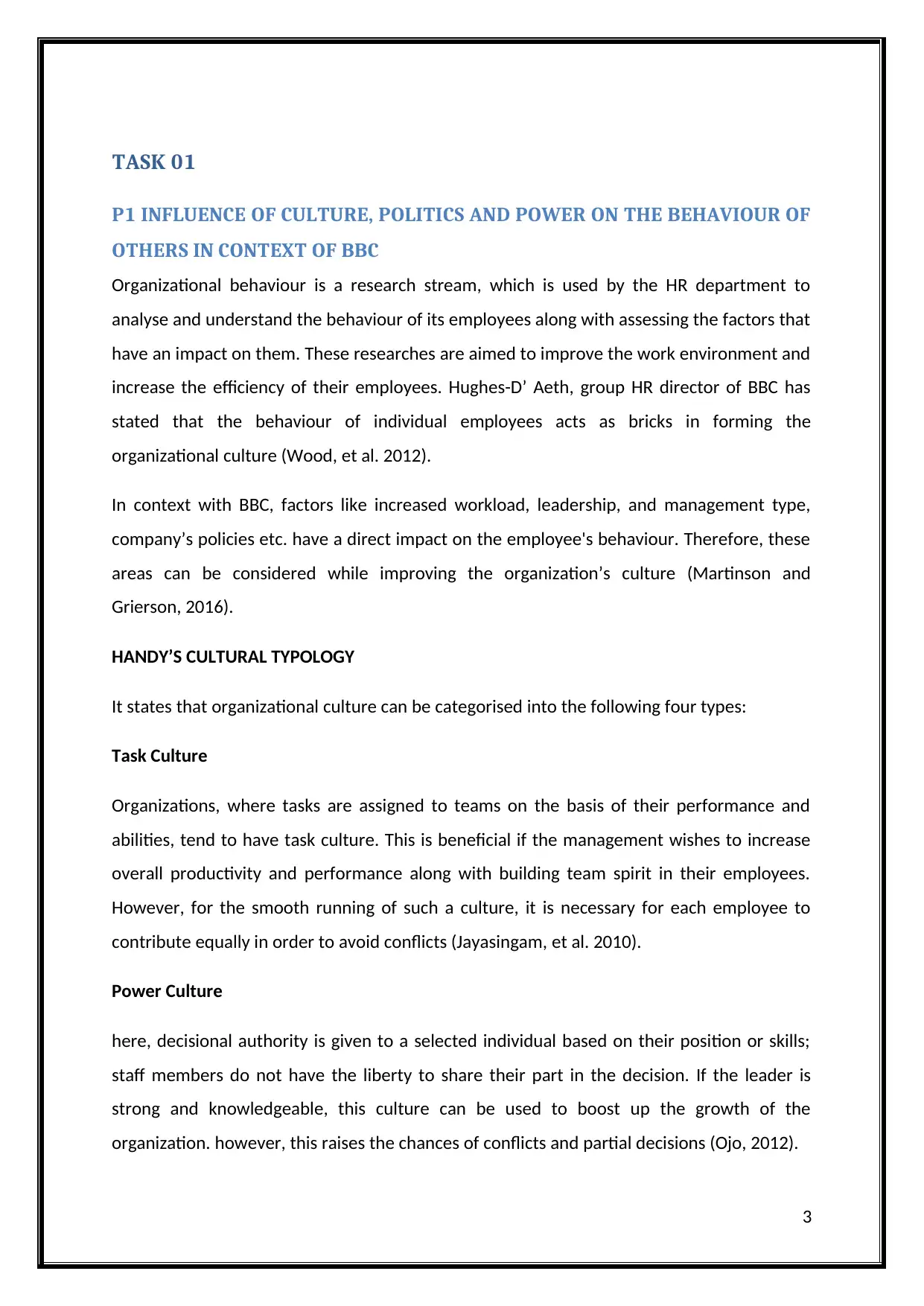
TASK 01
P1 INFLUENCE OF CULTURE, POLITICS AND POWER ON THE BEHAVIOUR OF
OTHERS IN CONTEXT OF BBC
Organizational behaviour is a research stream, which is used by the HR department to
analyse and understand the behaviour of its employees along with assessing the factors that
have an impact on them. These researches are aimed to improve the work environment and
increase the efficiency of their employees. Hughes-D’ Aeth, group HR director of BBC has
stated that the behaviour of individual employees acts as bricks in forming the
organizational culture (Wood, et al. 2012).
In context with BBC, factors like increased workload, leadership, and management type,
company’s policies etc. have a direct impact on the employee's behaviour. Therefore, these
areas can be considered while improving the organization’s culture (Martinson and
Grierson, 2016).
HANDY’S CULTURAL TYPOLOGY
It states that organizational culture can be categorised into the following four types:
Task Culture
Organizations, where tasks are assigned to teams on the basis of their performance and
abilities, tend to have task culture. This is beneficial if the management wishes to increase
overall productivity and performance along with building team spirit in their employees.
However, for the smooth running of such a culture, it is necessary for each employee to
contribute equally in order to avoid conflicts (Jayasingam, et al. 2010).
Power Culture
here, decisional authority is given to a selected individual based on their position or skills;
staff members do not have the liberty to share their part in the decision. If the leader is
strong and knowledgeable, this culture can be used to boost up the growth of the
organization. however, this raises the chances of conflicts and partial decisions (Ojo, 2012).
3
P1 INFLUENCE OF CULTURE, POLITICS AND POWER ON THE BEHAVIOUR OF
OTHERS IN CONTEXT OF BBC
Organizational behaviour is a research stream, which is used by the HR department to
analyse and understand the behaviour of its employees along with assessing the factors that
have an impact on them. These researches are aimed to improve the work environment and
increase the efficiency of their employees. Hughes-D’ Aeth, group HR director of BBC has
stated that the behaviour of individual employees acts as bricks in forming the
organizational culture (Wood, et al. 2012).
In context with BBC, factors like increased workload, leadership, and management type,
company’s policies etc. have a direct impact on the employee's behaviour. Therefore, these
areas can be considered while improving the organization’s culture (Martinson and
Grierson, 2016).
HANDY’S CULTURAL TYPOLOGY
It states that organizational culture can be categorised into the following four types:
Task Culture
Organizations, where tasks are assigned to teams on the basis of their performance and
abilities, tend to have task culture. This is beneficial if the management wishes to increase
overall productivity and performance along with building team spirit in their employees.
However, for the smooth running of such a culture, it is necessary for each employee to
contribute equally in order to avoid conflicts (Jayasingam, et al. 2010).
Power Culture
here, decisional authority is given to a selected individual based on their position or skills;
staff members do not have the liberty to share their part in the decision. If the leader is
strong and knowledgeable, this culture can be used to boost up the growth of the
organization. however, this raises the chances of conflicts and partial decisions (Ojo, 2012).
3
Paraphrase This Document
Need a fresh take? Get an instant paraphrase of this document with our AI Paraphraser
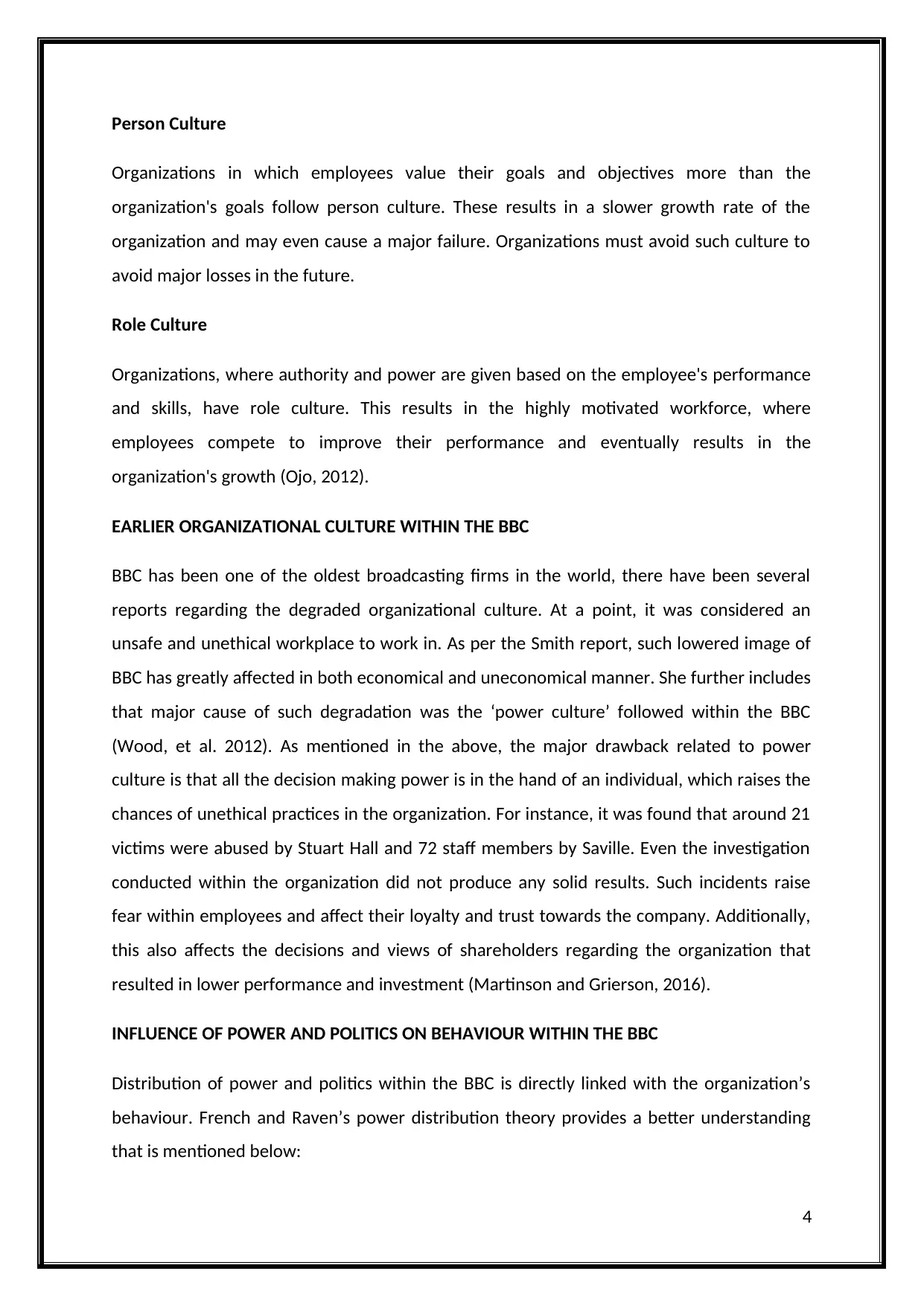
Person Culture
Organizations in which employees value their goals and objectives more than the
organization's goals follow person culture. These results in a slower growth rate of the
organization and may even cause a major failure. Organizations must avoid such culture to
avoid major losses in the future.
Role Culture
Organizations, where authority and power are given based on the employee's performance
and skills, have role culture. This results in the highly motivated workforce, where
employees compete to improve their performance and eventually results in the
organization's growth (Ojo, 2012).
EARLIER ORGANIZATIONAL CULTURE WITHIN THE BBC
BBC has been one of the oldest broadcasting firms in the world, there have been several
reports regarding the degraded organizational culture. At a point, it was considered an
unsafe and unethical workplace to work in. As per the Smith report, such lowered image of
BBC has greatly affected in both economical and uneconomical manner. She further includes
that major cause of such degradation was the ‘power culture’ followed within the BBC
(Wood, et al. 2012). As mentioned in the above, the major drawback related to power
culture is that all the decision making power is in the hand of an individual, which raises the
chances of unethical practices in the organization. For instance, it was found that around 21
victims were abused by Stuart Hall and 72 staff members by Saville. Even the investigation
conducted within the organization did not produce any solid results. Such incidents raise
fear within employees and affect their loyalty and trust towards the company. Additionally,
this also affects the decisions and views of shareholders regarding the organization that
resulted in lower performance and investment (Martinson and Grierson, 2016).
INFLUENCE OF POWER AND POLITICS ON BEHAVIOUR WITHIN THE BBC
Distribution of power and politics within the BBC is directly linked with the organization’s
behaviour. French and Raven’s power distribution theory provides a better understanding
that is mentioned below:
4
Organizations in which employees value their goals and objectives more than the
organization's goals follow person culture. These results in a slower growth rate of the
organization and may even cause a major failure. Organizations must avoid such culture to
avoid major losses in the future.
Role Culture
Organizations, where authority and power are given based on the employee's performance
and skills, have role culture. This results in the highly motivated workforce, where
employees compete to improve their performance and eventually results in the
organization's growth (Ojo, 2012).
EARLIER ORGANIZATIONAL CULTURE WITHIN THE BBC
BBC has been one of the oldest broadcasting firms in the world, there have been several
reports regarding the degraded organizational culture. At a point, it was considered an
unsafe and unethical workplace to work in. As per the Smith report, such lowered image of
BBC has greatly affected in both economical and uneconomical manner. She further includes
that major cause of such degradation was the ‘power culture’ followed within the BBC
(Wood, et al. 2012). As mentioned in the above, the major drawback related to power
culture is that all the decision making power is in the hand of an individual, which raises the
chances of unethical practices in the organization. For instance, it was found that around 21
victims were abused by Stuart Hall and 72 staff members by Saville. Even the investigation
conducted within the organization did not produce any solid results. Such incidents raise
fear within employees and affect their loyalty and trust towards the company. Additionally,
this also affects the decisions and views of shareholders regarding the organization that
resulted in lower performance and investment (Martinson and Grierson, 2016).
INFLUENCE OF POWER AND POLITICS ON BEHAVIOUR WITHIN THE BBC
Distribution of power and politics within the BBC is directly linked with the organization’s
behaviour. French and Raven’s power distribution theory provides a better understanding
that is mentioned below:
4
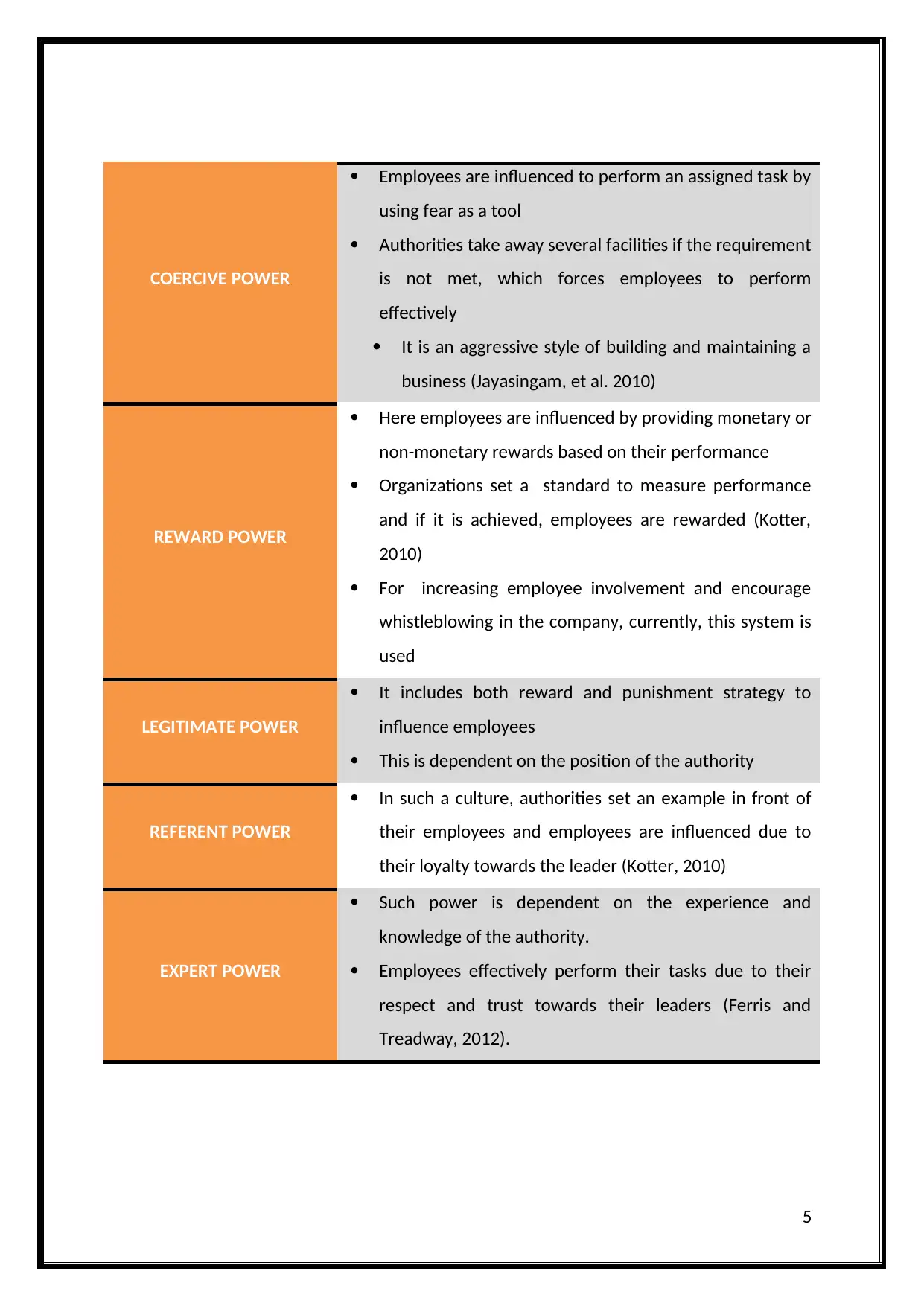
COERCIVE POWER
Employees are influenced to perform an assigned task by
using fear as a tool
Authorities take away several facilities if the requirement
is not met, which forces employees to perform
effectively
It is an aggressive style of building and maintaining a
business (Jayasingam, et al. 2010)
REWARD POWER
Here employees are influenced by providing monetary or
non-monetary rewards based on their performance
Organizations set a standard to measure performance
and if it is achieved, employees are rewarded (Kotter,
2010)
For increasing employee involvement and encourage
whistleblowing in the company, currently, this system is
used
LEGITIMATE POWER
It includes both reward and punishment strategy to
influence employees
This is dependent on the position of the authority
REFERENT POWER
In such a culture, authorities set an example in front of
their employees and employees are influenced due to
their loyalty towards the leader (Kotter, 2010)
EXPERT POWER
Such power is dependent on the experience and
knowledge of the authority.
Employees effectively perform their tasks due to their
respect and trust towards their leaders (Ferris and
Treadway, 2012).
5
Employees are influenced to perform an assigned task by
using fear as a tool
Authorities take away several facilities if the requirement
is not met, which forces employees to perform
effectively
It is an aggressive style of building and maintaining a
business (Jayasingam, et al. 2010)
REWARD POWER
Here employees are influenced by providing monetary or
non-monetary rewards based on their performance
Organizations set a standard to measure performance
and if it is achieved, employees are rewarded (Kotter,
2010)
For increasing employee involvement and encourage
whistleblowing in the company, currently, this system is
used
LEGITIMATE POWER
It includes both reward and punishment strategy to
influence employees
This is dependent on the position of the authority
REFERENT POWER
In such a culture, authorities set an example in front of
their employees and employees are influenced due to
their loyalty towards the leader (Kotter, 2010)
EXPERT POWER
Such power is dependent on the experience and
knowledge of the authority.
Employees effectively perform their tasks due to their
respect and trust towards their leaders (Ferris and
Treadway, 2012).
5
⊘ This is a preview!⊘
Do you want full access?
Subscribe today to unlock all pages.

Trusted by 1+ million students worldwide
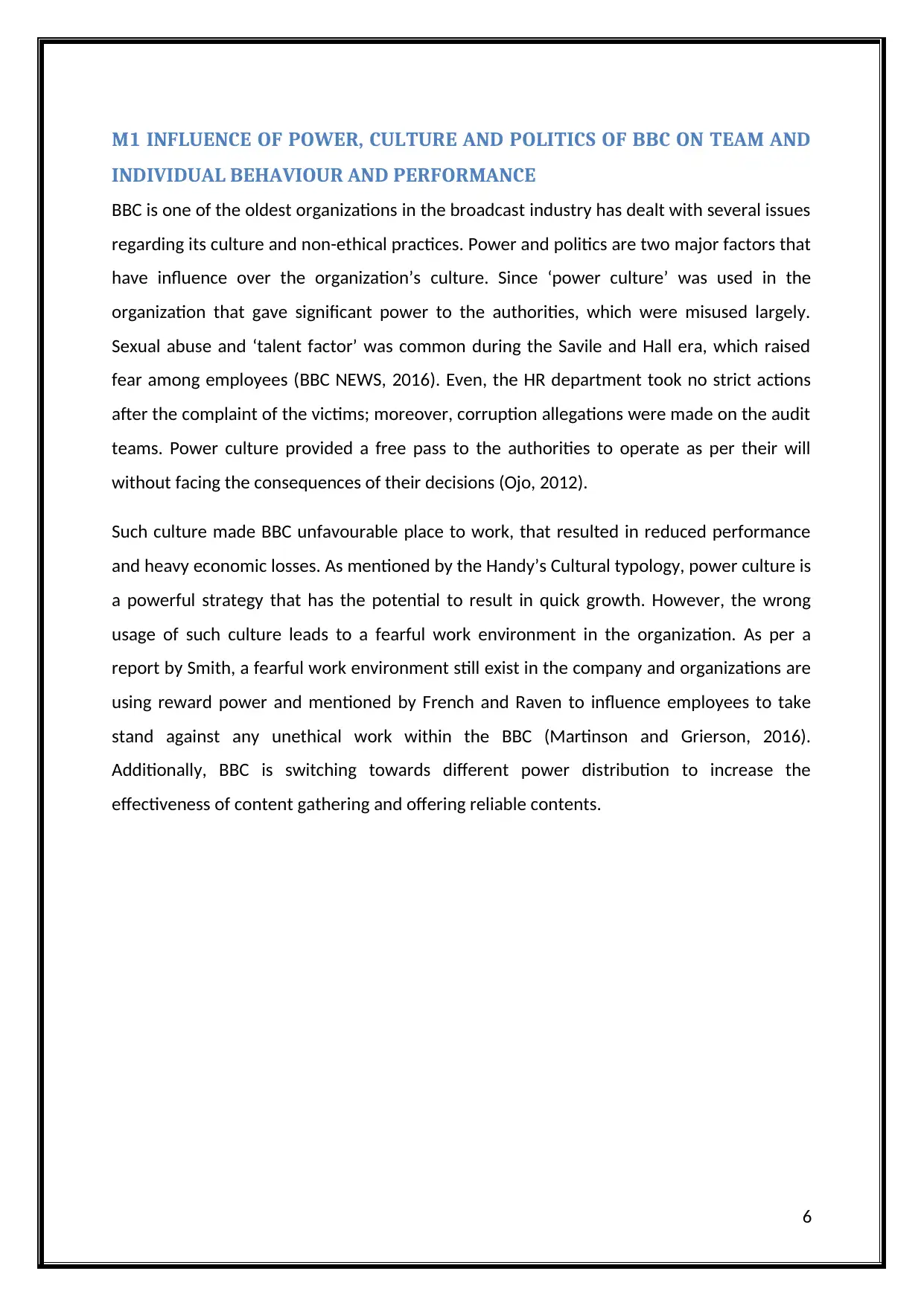
M1 INFLUENCE OF POWER, CULTURE AND POLITICS OF BBC ON TEAM AND
INDIVIDUAL BEHAVIOUR AND PERFORMANCE
BBC is one of the oldest organizations in the broadcast industry has dealt with several issues
regarding its culture and non-ethical practices. Power and politics are two major factors that
have influence over the organization’s culture. Since ‘power culture’ was used in the
organization that gave significant power to the authorities, which were misused largely.
Sexual abuse and ‘talent factor’ was common during the Savile and Hall era, which raised
fear among employees (BBC NEWS, 2016). Even, the HR department took no strict actions
after the complaint of the victims; moreover, corruption allegations were made on the audit
teams. Power culture provided a free pass to the authorities to operate as per their will
without facing the consequences of their decisions (Ojo, 2012).
Such culture made BBC unfavourable place to work, that resulted in reduced performance
and heavy economic losses. As mentioned by the Handy’s Cultural typology, power culture is
a powerful strategy that has the potential to result in quick growth. However, the wrong
usage of such culture leads to a fearful work environment in the organization. As per a
report by Smith, a fearful work environment still exist in the company and organizations are
using reward power and mentioned by French and Raven to influence employees to take
stand against any unethical work within the BBC (Martinson and Grierson, 2016).
Additionally, BBC is switching towards different power distribution to increase the
effectiveness of content gathering and offering reliable contents.
6
INDIVIDUAL BEHAVIOUR AND PERFORMANCE
BBC is one of the oldest organizations in the broadcast industry has dealt with several issues
regarding its culture and non-ethical practices. Power and politics are two major factors that
have influence over the organization’s culture. Since ‘power culture’ was used in the
organization that gave significant power to the authorities, which were misused largely.
Sexual abuse and ‘talent factor’ was common during the Savile and Hall era, which raised
fear among employees (BBC NEWS, 2016). Even, the HR department took no strict actions
after the complaint of the victims; moreover, corruption allegations were made on the audit
teams. Power culture provided a free pass to the authorities to operate as per their will
without facing the consequences of their decisions (Ojo, 2012).
Such culture made BBC unfavourable place to work, that resulted in reduced performance
and heavy economic losses. As mentioned by the Handy’s Cultural typology, power culture is
a powerful strategy that has the potential to result in quick growth. However, the wrong
usage of such culture leads to a fearful work environment in the organization. As per a
report by Smith, a fearful work environment still exist in the company and organizations are
using reward power and mentioned by French and Raven to influence employees to take
stand against any unethical work within the BBC (Martinson and Grierson, 2016).
Additionally, BBC is switching towards different power distribution to increase the
effectiveness of content gathering and offering reliable contents.
6
Paraphrase This Document
Need a fresh take? Get an instant paraphrase of this document with our AI Paraphraser
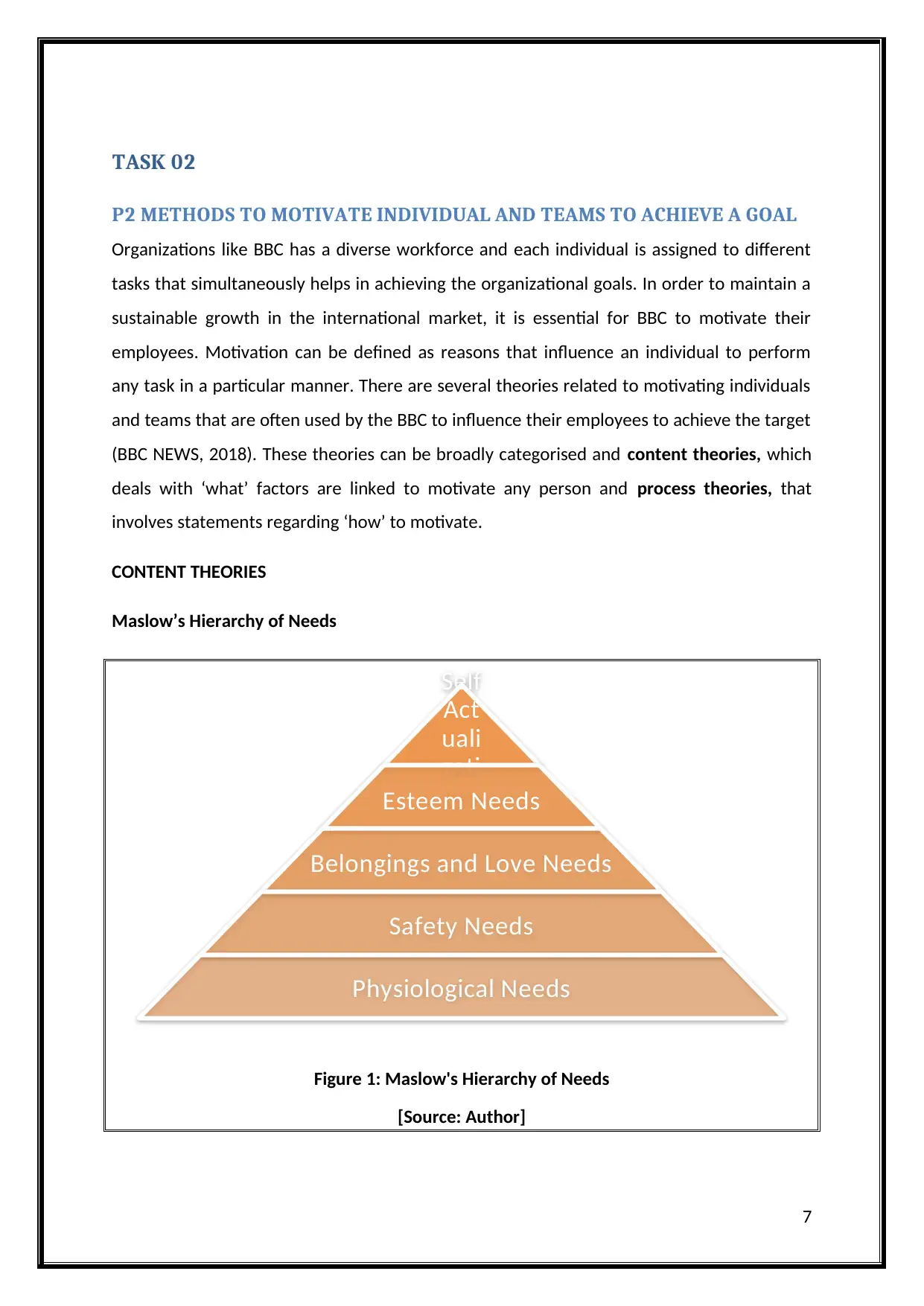
TASK 02
P2 METHODS TO MOTIVATE INDIVIDUAL AND TEAMS TO ACHIEVE A GOAL
Organizations like BBC has a diverse workforce and each individual is assigned to different
tasks that simultaneously helps in achieving the organizational goals. In order to maintain a
sustainable growth in the international market, it is essential for BBC to motivate their
employees. Motivation can be defined as reasons that influence an individual to perform
any task in a particular manner. There are several theories related to motivating individuals
and teams that are often used by the BBC to influence their employees to achieve the target
(BBC NEWS, 2018). These theories can be broadly categorised and content theories, which
deals with ‘what’ factors are linked to motivate any person and process theories, that
involves statements regarding ‘how’ to motivate.
CONTENT THEORIES
Maslow’s Hierarchy of Needs
Figure 1: Maslow's Hierarchy of Needs
[Source: Author]
7
Self
Act
uali
zati
onEsteem Needs
Belongings and Love Needs
Safety Needs
Physiological Needs
P2 METHODS TO MOTIVATE INDIVIDUAL AND TEAMS TO ACHIEVE A GOAL
Organizations like BBC has a diverse workforce and each individual is assigned to different
tasks that simultaneously helps in achieving the organizational goals. In order to maintain a
sustainable growth in the international market, it is essential for BBC to motivate their
employees. Motivation can be defined as reasons that influence an individual to perform
any task in a particular manner. There are several theories related to motivating individuals
and teams that are often used by the BBC to influence their employees to achieve the target
(BBC NEWS, 2018). These theories can be broadly categorised and content theories, which
deals with ‘what’ factors are linked to motivate any person and process theories, that
involves statements regarding ‘how’ to motivate.
CONTENT THEORIES
Maslow’s Hierarchy of Needs
Figure 1: Maslow's Hierarchy of Needs
[Source: Author]
7
Self
Act
uali
zati
onEsteem Needs
Belongings and Love Needs
Safety Needs
Physiological Needs
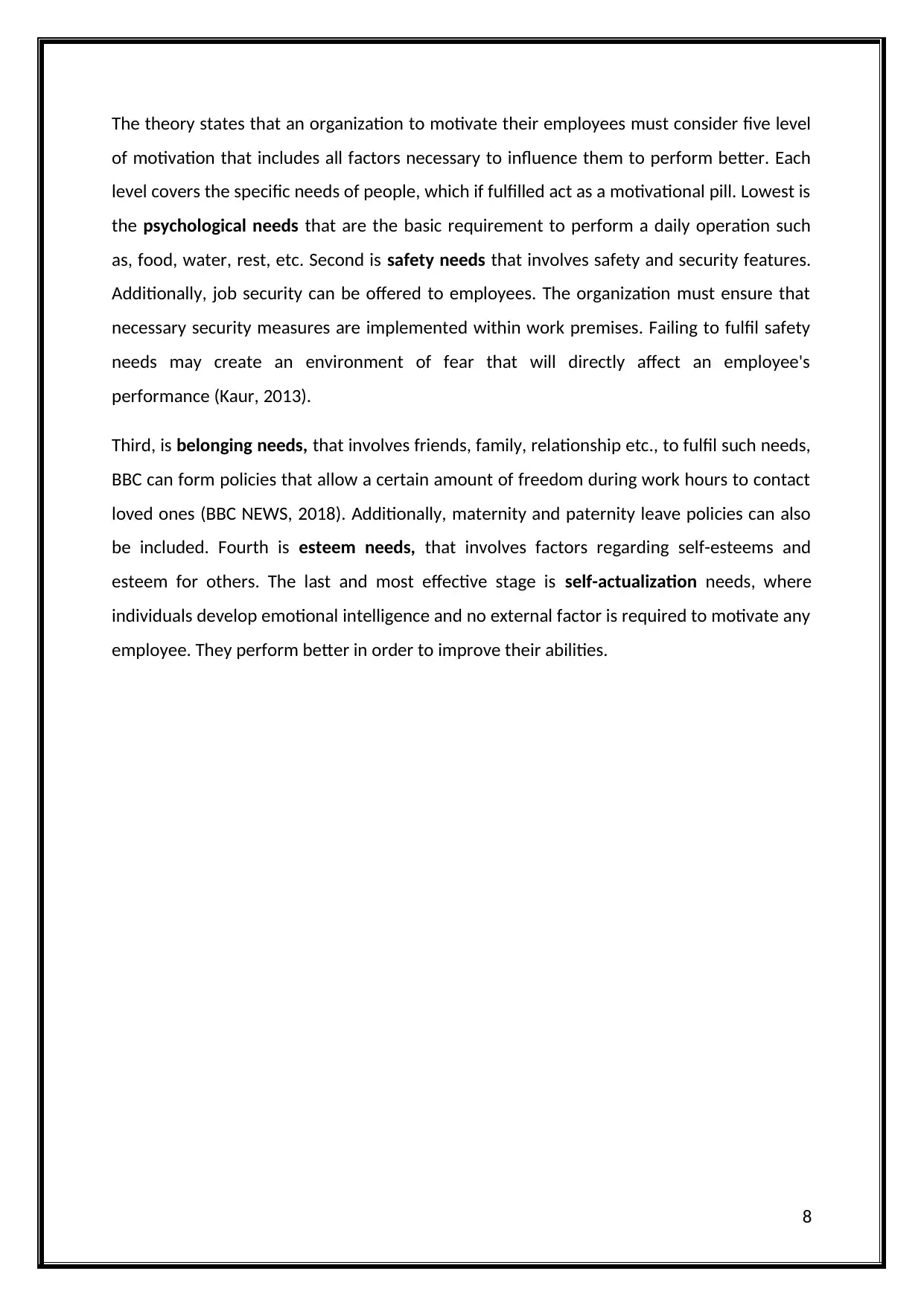
The theory states that an organization to motivate their employees must consider five level
of motivation that includes all factors necessary to influence them to perform better. Each
level covers the specific needs of people, which if fulfilled act as a motivational pill. Lowest is
the psychological needs that are the basic requirement to perform a daily operation such
as, food, water, rest, etc. Second is safety needs that involves safety and security features.
Additionally, job security can be offered to employees. The organization must ensure that
necessary security measures are implemented within work premises. Failing to fulfil safety
needs may create an environment of fear that will directly affect an employee's
performance (Kaur, 2013).
Third, is belonging needs, that involves friends, family, relationship etc., to fulfil such needs,
BBC can form policies that allow a certain amount of freedom during work hours to contact
loved ones (BBC NEWS, 2018). Additionally, maternity and paternity leave policies can also
be included. Fourth is esteem needs, that involves factors regarding self-esteems and
esteem for others. The last and most effective stage is self-actualization needs, where
individuals develop emotional intelligence and no external factor is required to motivate any
employee. They perform better in order to improve their abilities.
8
of motivation that includes all factors necessary to influence them to perform better. Each
level covers the specific needs of people, which if fulfilled act as a motivational pill. Lowest is
the psychological needs that are the basic requirement to perform a daily operation such
as, food, water, rest, etc. Second is safety needs that involves safety and security features.
Additionally, job security can be offered to employees. The organization must ensure that
necessary security measures are implemented within work premises. Failing to fulfil safety
needs may create an environment of fear that will directly affect an employee's
performance (Kaur, 2013).
Third, is belonging needs, that involves friends, family, relationship etc., to fulfil such needs,
BBC can form policies that allow a certain amount of freedom during work hours to contact
loved ones (BBC NEWS, 2018). Additionally, maternity and paternity leave policies can also
be included. Fourth is esteem needs, that involves factors regarding self-esteems and
esteem for others. The last and most effective stage is self-actualization needs, where
individuals develop emotional intelligence and no external factor is required to motivate any
employee. They perform better in order to improve their abilities.
8
⊘ This is a preview!⊘
Do you want full access?
Subscribe today to unlock all pages.

Trusted by 1+ million students worldwide

Figure 2: Motivational Theories
[Source: Author]
Managers at BBC have several options in order to motivate teams and individuals, Maslow's
need of hierarchy provide a wide range of options that can be used and altered as per the
situations and needs. By analysing and understanding the needs of individuals and teams
different factors can be fulfilled.
PROCESS THEORY
Adam’s Equity Theory
This theory states that motivational rewards offered by the organization to individuals,
teams, and their efforts must be balanced in order to influence them to perform better.
Factors that can be considered during offering rewards are their work quality, loyalty,
9
Motivational
Theories
Content Theories
Maslow's Need
Hierarchy
Herzberg's
Motivation-
Hygiene Theory
McClelland's
Needs Theory
Alderfer's ERG
Theory
Process Theories
Vroom's
Expectancy
Theory
Adam's Equity
Theory
Goal Setting
Theory
Reinforcement
Theory
[Source: Author]
Managers at BBC have several options in order to motivate teams and individuals, Maslow's
need of hierarchy provide a wide range of options that can be used and altered as per the
situations and needs. By analysing and understanding the needs of individuals and teams
different factors can be fulfilled.
PROCESS THEORY
Adam’s Equity Theory
This theory states that motivational rewards offered by the organization to individuals,
teams, and their efforts must be balanced in order to influence them to perform better.
Factors that can be considered during offering rewards are their work quality, loyalty,
9
Motivational
Theories
Content Theories
Maslow's Need
Hierarchy
Herzberg's
Motivation-
Hygiene Theory
McClelland's
Needs Theory
Alderfer's ERG
Theory
Process Theories
Vroom's
Expectancy
Theory
Adam's Equity
Theory
Goal Setting
Theory
Reinforcement
Theory
Paraphrase This Document
Need a fresh take? Get an instant paraphrase of this document with our AI Paraphraser

commitment etc. BBC maintain a proper balance between the input and output factors;
monetary rewards given to the content provider is based on the authenticity and
uniqueness of content (Moore, 2014).
Vroom’s Expectancy Theory
It is related to employee performance, outcomes, and states that their performance is
dependent on individual factors like skills, experience, knowledge etc. Further, it is classified
into three variables, expectancy can be considered as the belief of employees that
increased effort will result is increased performance (Moore, 2014). Instrumentality refers
to the belied of employees that, increased performance will lead to certain kind of reward.
Lastly, valance involves the understanding that rewards system must be flexible i.e. based
on the requirement of employees, the reward must be allotted to them. this three variables
can be chosen by the management and HR department in order to increase the involvement
of employees and rebuilt the image it once had (Jayasingam, et al. 2010).
10
monetary rewards given to the content provider is based on the authenticity and
uniqueness of content (Moore, 2014).
Vroom’s Expectancy Theory
It is related to employee performance, outcomes, and states that their performance is
dependent on individual factors like skills, experience, knowledge etc. Further, it is classified
into three variables, expectancy can be considered as the belief of employees that
increased effort will result is increased performance (Moore, 2014). Instrumentality refers
to the belied of employees that, increased performance will lead to certain kind of reward.
Lastly, valance involves the understanding that rewards system must be flexible i.e. based
on the requirement of employees, the reward must be allotted to them. this three variables
can be chosen by the management and HR department in order to increase the involvement
of employees and rebuilt the image it once had (Jayasingam, et al. 2010).
10
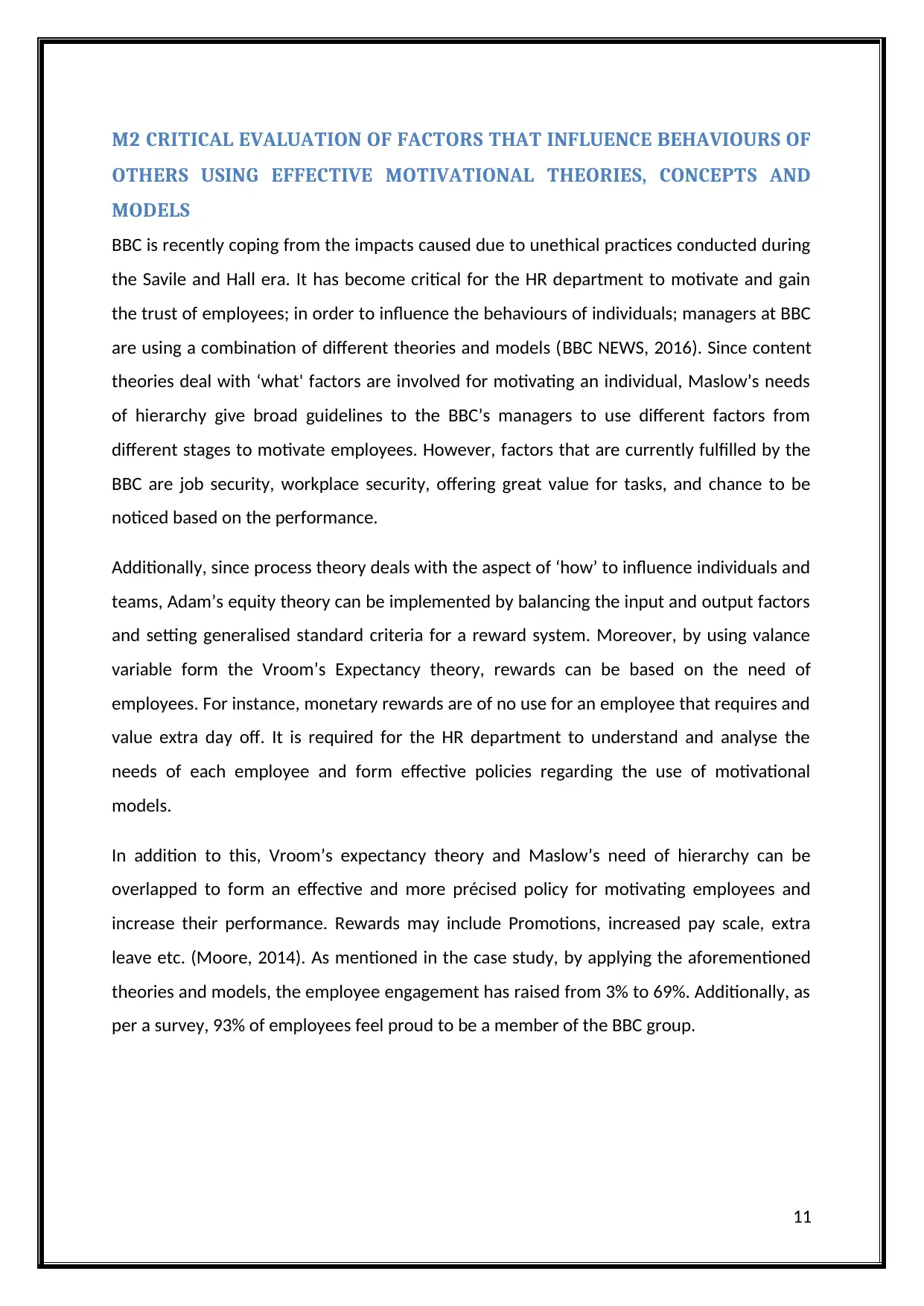
M2 CRITICAL EVALUATION OF FACTORS THAT INFLUENCE BEHAVIOURS OF
OTHERS USING EFFECTIVE MOTIVATIONAL THEORIES, CONCEPTS AND
MODELS
BBC is recently coping from the impacts caused due to unethical practices conducted during
the Savile and Hall era. It has become critical for the HR department to motivate and gain
the trust of employees; in order to influence the behaviours of individuals; managers at BBC
are using a combination of different theories and models (BBC NEWS, 2016). Since content
theories deal with ‘what' factors are involved for motivating an individual, Maslow’s needs
of hierarchy give broad guidelines to the BBC’s managers to use different factors from
different stages to motivate employees. However, factors that are currently fulfilled by the
BBC are job security, workplace security, offering great value for tasks, and chance to be
noticed based on the performance.
Additionally, since process theory deals with the aspect of ‘how’ to influence individuals and
teams, Adam’s equity theory can be implemented by balancing the input and output factors
and setting generalised standard criteria for a reward system. Moreover, by using valance
variable form the Vroom’s Expectancy theory, rewards can be based on the need of
employees. For instance, monetary rewards are of no use for an employee that requires and
value extra day off. It is required for the HR department to understand and analyse the
needs of each employee and form effective policies regarding the use of motivational
models.
In addition to this, Vroom’s expectancy theory and Maslow’s need of hierarchy can be
overlapped to form an effective and more précised policy for motivating employees and
increase their performance. Rewards may include Promotions, increased pay scale, extra
leave etc. (Moore, 2014). As mentioned in the case study, by applying the aforementioned
theories and models, the employee engagement has raised from 3% to 69%. Additionally, as
per a survey, 93% of employees feel proud to be a member of the BBC group.
11
OTHERS USING EFFECTIVE MOTIVATIONAL THEORIES, CONCEPTS AND
MODELS
BBC is recently coping from the impacts caused due to unethical practices conducted during
the Savile and Hall era. It has become critical for the HR department to motivate and gain
the trust of employees; in order to influence the behaviours of individuals; managers at BBC
are using a combination of different theories and models (BBC NEWS, 2016). Since content
theories deal with ‘what' factors are involved for motivating an individual, Maslow’s needs
of hierarchy give broad guidelines to the BBC’s managers to use different factors from
different stages to motivate employees. However, factors that are currently fulfilled by the
BBC are job security, workplace security, offering great value for tasks, and chance to be
noticed based on the performance.
Additionally, since process theory deals with the aspect of ‘how’ to influence individuals and
teams, Adam’s equity theory can be implemented by balancing the input and output factors
and setting generalised standard criteria for a reward system. Moreover, by using valance
variable form the Vroom’s Expectancy theory, rewards can be based on the need of
employees. For instance, monetary rewards are of no use for an employee that requires and
value extra day off. It is required for the HR department to understand and analyse the
needs of each employee and form effective policies regarding the use of motivational
models.
In addition to this, Vroom’s expectancy theory and Maslow’s need of hierarchy can be
overlapped to form an effective and more précised policy for motivating employees and
increase their performance. Rewards may include Promotions, increased pay scale, extra
leave etc. (Moore, 2014). As mentioned in the case study, by applying the aforementioned
theories and models, the employee engagement has raised from 3% to 69%. Additionally, as
per a survey, 93% of employees feel proud to be a member of the BBC group.
11
⊘ This is a preview!⊘
Do you want full access?
Subscribe today to unlock all pages.

Trusted by 1+ million students worldwide
1 out of 25
Related Documents
Your All-in-One AI-Powered Toolkit for Academic Success.
+13062052269
info@desklib.com
Available 24*7 on WhatsApp / Email
![[object Object]](/_next/static/media/star-bottom.7253800d.svg)
Unlock your academic potential
Copyright © 2020–2026 A2Z Services. All Rights Reserved. Developed and managed by ZUCOL.





